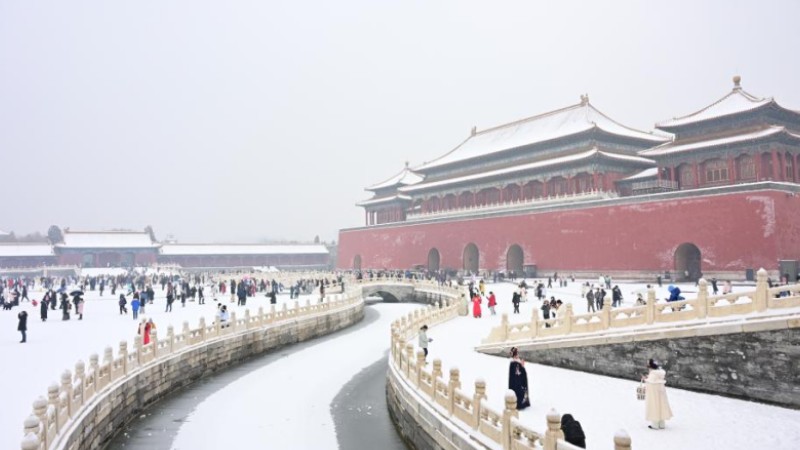BRI chalks up a decade of far-reaching achievements

LI MIN/CHINA DAILY
Initiative the new economic development philosophy of 21st century
When visiting his family in Bangladesh in August, Mostak Ahamed Galib eagerly anticipated seeing the Padma Bridge, known among locals as the "bridge of dreams".
The Chinese-built structure, the longest bridge spanning the Padma River, officially opened in June last year, reducing travel time from southwestern areas of Bangladesh to Dhaka, the capital, from seven or eight hours to as little as 10 minutes.
"The bridge put an end to centuries of reliance on local ferries," said Galib, who is director of cross-cultural communication and the Belt and Road Initiative research center at Wuhan University of Technology.
"The bridge is now bustling with people and vehicles, and new buildings are being erected nearby," he added.
The Bangladeshi government said the bridge is expected to contribute 1.23 percentage points to the nation's GDP growth and reduce poverty annually by 0.84 percentage point.
Galib said, "The Padma Bridge serves as an impressive testament to how the Belt and Road Initiative brings tangible benefits to ordinary individuals worldwide, and similar stories have been happening across the globe."
Drawing inspiration from the ancient Silk Road and focusing on enhancing connectivity, the BRI aims to enhance policy, infrastructure, trade, financial, and people-to-people connectivity. It also seeks to inject new impetus into the world economy, create fresh opportunities for global development, and build a new platform for international economic cooperation.
Over the past decade, Belt and Road cooperation has extended from the Eurasian continent to Africa and Latin America. More than 150 countries and over 30 international organizations have signed Belt and Road cooperation documents.
Eight major steps that China will take to bring Belt and Road cooperation to a new stage of higher-quality and higher-level development were unveiled at the Third Belt and Road Forum for International Cooperation in October. These steps include efforts to build a multidimensional Belt and Road connectivity network, support an open world economy, promote green development, and advance scientific and technological innovation.
Global community
Liu Ying, a researcher at Renmin University of China's Chongyang Institute for Financial Studies, said the BRI aligns with the concept of a global community of shared future.
The concept advocates that all peoples, all countries, and all individuals' destinies are interconnected, so they must stand together and endeavor to build a global community of shared future. This means an open, inclusive, clean and beautiful world that enjoys lasting peace, universal security, and common prosperity — turning people's desire for a better life into reality, Liu said.
"The BRI is a great practice of building a global community of shared future, and it also provides a platform for realizing that grand vision," she added.
The initiative has also played an important role in implementing the United Nations' 2030 Agenda for Sustainable Development, she said.
Starting with infrastructure construction, the BRI helps developing countries solve the bottleneck of infrastructure connectivity, thus promoting trade and investment liberalization and facilitation, and promoting growth of the world economy, Liu said.
"It has also made great contributions to promoting the solution to common challenges faced by all countries, such as climate change and poverty reduction," she said.
In the past 10 years, Belt and Road cooperation has generated nearly $1 trillion of investment, resulted in more than 3,000 cooperation projects, and lifted nearly 40 million people out of poverty, official figures show.
Liu said the initiative has achieved great results in just a decade and has been widely welcomed by the world — which is closely related to its development concepts.
"Unlike some initiatives that emphasize a zero-sum game, the BRI aims for high standards, sustainability, and better lives. It emphasizes high-quality and win-win cooperation in pursuit of the greater good and shared interests, and is committed to open, green, and clean cooperation toward inclusive and sustainable development," she said.
Koh King Kee, president of the Center for New Inclusive Asia, a Malaysian think tank, said that over the past decade, the BRI has evolved from a connectivity project based on the concept and spirit of the ancient Silk Road into an inclusive global cooperation partnership.
"It is led and driven by China, and owned by all the partner countries," he said.
China is sharing its development experiences of the past 40 years with BRI partner countries. The initiative is the new economic development philosophy of the 21st century, emphasizing that infrastructure must be built moderately ahead of demand. Infrastructure should be built to facilitate economic development, not just to satisfy market needs, Koh said.
"The BRI is also China's concrete manifestation of its peaceful rise. China is a key player in the global system. It does not want to be a free rider, but to contribute to the prosperity of the world," he added.
Through the BRI, China shares its technological expertise, provides necessary financing and manpower for infrastructure development, and opens its huge domestic market to the world, as it believes a prosperous world is good for everyone, Koh said.
A report by the World Bank said the BRI has increased the trade of participating parties by 4.1 percent and attracted 5 percent more foreign investment. By 2030, the initiative will generate $1.6 trillion in global revenue each year, accounting for 1.3 percent of global GDP.
Ehizuelen Michael Mitchell Omoruyi, executive director of the Center for Nigerian Studies at Zhejiang Normal University's Institute of African Studies, said the BRI is "a novel worldwide development model" that has proved effective over the past decade.
For example, Africa is plagued with inadequate transportation infrastructure, which has been a major economic hurdle to its advancement of industries and exports.
As part of BRI cooperation, Chinese companies have helped Africa build rail infrastructure that has boosted two-way trade and improved transportation services among nations, such as the Ethiopia-Djibouti Railway and the Mombasa-Nairobi Standard Gauge Railway project.
"With the development of African nations, the BRI set a new path for a higher level of China-Africa cooperation that will help increase foreign investment, expand trade, ultimately reduce poverty, and in turn, reshape Sino-African cooperation by supporting connectivity in and between economies on the continent of Africa," Omoruyi said.
Having done extensive research in Africa as a scholar, Omoruyi has witnessed the BRI positively impacting the continent's residents by providing them with job opportunities.
He cited the example of Shuaibu Ibrahim, a Nigerian father of five, who now runs a provisions store at Rigasa station on the Abuja-Kaduna railway in Nigeria. He is one of some 100 young men whose livelihoods are directly linked to this station, which is situated in Abuja.
"In less than a year, I have been able to build a house. When I worked for an oil company for several years, I could not even acquire a plot of land. The train station has not only changed the lives of those doing business here, but has also brought development to the entire Rigasa community," Omoruyi quoted Ibrahim as saying.
More exchanges
Nasser Bouchiba, president of the Africa-China Cooperation Association for Development, said that during the past decade, the BRI has triggered an increase in people-to-people exchanges and mutual learning among civilizations worldwide.
"At a time when global conservatism and hegemonism are prevalent, the BRI has once again promoted people-to-people exchanges and mutual learning among civilizations. It has also sounded a clarinet for globalization and multilateral cooperation, and made equal dialogue, understanding, inclusiveness and cooperation among different civilizations the main theme," he said.
Bouchiba said the BRI will continue to bring huge benefits to countries involved in the initiative, and hopefully for their development.
He said he hopes the initiative will continue to act as a platform for broad international cooperation, promote China's investment and trade in Africa, bring more fruitful results for African countries to improve infrastructure construction and promote industrial upgrading and development, and enable Africans to truly feel the benefits brought by the BRI.
Photos
Related Stories
- Interview: BRI a "game-changer" transforming economic competitiveness of partners, says Malaysian expert
- Belt and Road Initiative promotes global wellbeing, human rights
- Closer trade ties bring more Latin American fresh produce to Chinese consumers
- First tracks laid for Malaysia's mega rail project
- More than half of cooperation initiatives reached at BRF start to be implemented
- Interview: Closer Belt and Road cooperation to strengthen Jordan-China partnership, says expert
Copyright © 2023 People's Daily Online. All Rights Reserved.









